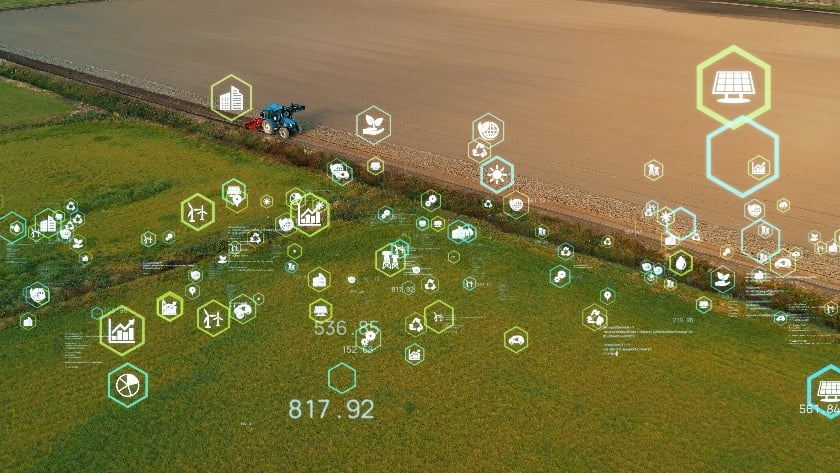
Technology is finding its way into the agricultural industry, to the point that it has become an indispensable part of many farming operations. The combination of traditional farming practices and modern, cutting-edge innovations has opened up a plethora of agricultural technology jobs and opportunities.
Defining Agricultural Technology Jobs
Agriculture technology jobs involve data analytics, technology, and engineering principles to promote sustainability, address challenges, and improve efficiency in farming. Agriculture technology jobs are also commonly referred to as ag-tech or agri-tech jobs.
13 Best Agri-Tech Jobs To Consider
While there are a wide variety of agricultural technology jobs, these are thirteen of the most common and interesting positions in this sector of agriculture.
1. Agricultural Drone Operator
While you may have used them for fun, drones are at the forefront of agricultural technology. Ag-tech drone operators fly drones with sensors and cameras to gather data on infestations, crop health, and soil conditions. The data they collect helps farmers make better-informed decisions about their crops, increasing productivity and effectiveness and maximizing resources.
2. Agriculture Technology Software Developer
Agri-tech software development involves crafting applications and software that helps with data analysis, farm management, and crop monitoring. Using skills such as coding, ag-tech software developers help streamline agricultural operations and ensure apps and programs are user-friendly for agronomists and farmers.
3. Sustainable Agriculture Analyst
Sustainability is a critical element of modern farming. Sustainable agriculture analysts evaluate the impact of farming on the environment at large to help farmers reduce their ecological footprint. This is one of many ideal ag technology jobs for people who love data analysis and sustainable practices. This allows them to help farmers integrate methods like regenerative agriculture or organic farming to help agricultural operations become more sustainable and profitable.
4. Farm Data Analyst
A farm data analyst evaluates crop performance, optimizes the allocation of resources, and helps predict market trends. These analysts help turn raw information into strategies and action plans to help farmers make more profitable and better-informed decisions.
5. IoT in Agriculture Specialist
Internet of Things agriculture specialists manage networks of interconnected sensors and devices on farms that gather data on equipment performance, weather, soil conditions, and moisture levels. In a way, they are the ones who change farms into smart farms.
6. Farm Automation Engineer
Many farms are adopting systems that plant, cultivate, and harvest entire crops with the utmost precision. With engineering skills, farm automation engineers design these systems and progress the state of automated farming. Farm automation engineers may use various systems to move toward automation, not just robotics.
7. Precision Agriculture Specialist
A precision agriculture specialist is another top agricultural technology job. These professionals use satellite images, data analytics, and GPS technology to help farmers optimize operations. They help maximize yields and minimize the use of resources.
Typically, they collect and analyze data, then use geographic information system (GIS) tools to map farms based on crop performance, moisture, and soil types. They create maps that show how much fertilizer and pesticides to apply to specific areas and can manage farming technology like GPS-guided tractors or devices equipped with sensors. They also identify and help prevent certain issues by analyzing patterns and current conditions.
8. Agricultural Biotechnologist
People who love technology and biology can work as agricultural biotechnologists. This job involves developing genetically engineered crops more resistant to environmental stressors, pests, and disease, and plants that can thrive in challenging conditions. This is a vital role in the agricultural world in the face of climate change.
9. Agricultural Robotics Engineer
Creating everything from automated weeding systems to robotic harvesters, agricultural robotics engineers help develop machines that perform intricate tasks, leading farms to peak efficiency. While this sounds similar to what farm automation engineers do, agricultural robotics engineers focus more on specific task automation, the physical design structure of the robots and necessary control systems and sensors.
10. Agricultural Cybersecurity Specialist
One of the agricultural technology jobs with the most growth right now is an agricultural cybersecurity specialist. While farms and cybersecurity may not seem to have much to do with one another, they do. When farms integrate technology like IoT, data, and networks, they need robust security plans, frequent risk assessments, and the best protection possible. Agri-tech cybersecurity specialists help keep data and technology safe from virtual attacks.
11. Aquaponics Specialist
The combination of hydroponics and aquaculture is aquaponics, which uses fish farming to aid in soilless plant cultivation. The fish waste gives nutrients to the plants, and the plants purify the water for the fish. Farmers harvest both the fish and plants. This and other alternative farming methods are gaining traction. Specialists in this area help design and manage aquaponics systems to make them more efficient.
12. Vertical Farming System Designer
Another unorthodox farming method is vertical farming. Vertical farming system designers work to develop and implement farming methods that optimize space by growing crops vertically. This type of farming involves climate control technology, hydroponic systems, and more, and is typically used by those in urban areas with limited space. Professionals interested in new farming technology and urban agriculture excel in these types of positions.
13. Agricultural Information Systems Manager
An agricultural information systems manager is responsible for streamlining communication and data flow by enhancing data accessibility and communication networks, managing databases, and creating software solutions tailored to a farm’s specific needs. They also provide training and support to farmers and employees who use the information systems they create. To help every farm reach its goals, ag-tech information systems managers collaborate with IT personnel to stay on top of technological advancements.
Finding Agricultural Technology Jobs
To find agricultural technology jobs that fit your interests, education, and skills, start your search on AgHires.com. Create a job seeker account and sign up for job alerts to receive personalized emails with new jobs that match your set criteria. Visit our Career Advice Blog for more industry trends and top resume and interview tips from our team of agriculture recruiters.






